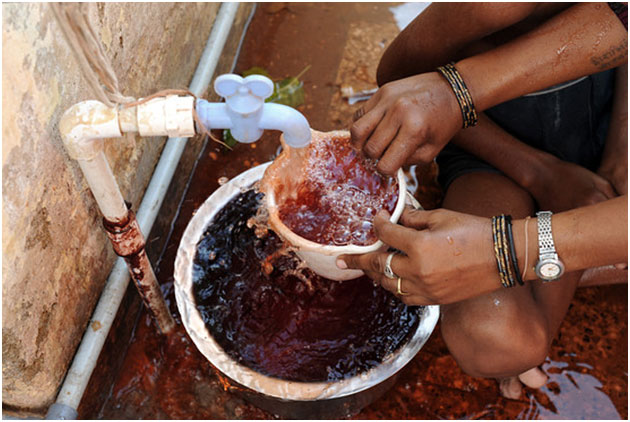WALL STREET JOURNAL (INDIA)
Lifestyle & Culture 18th Dec 13
Famous Writer Fixes Leaky Faucets
NUPUR ACHARYA
Aabid Surti is a famous Indian painter, playwright and cartoonist, creator of one of country’s longest running comic strip: Dhabbuji.
Since 2007, he has also been on a different mission–to save water in his neighborhood in Mumbai’s western suburb called Mira Road.
Almost every Sunday for the past six years, escorted by a plumber and a volunteer, Mr. Surti, 77, has been traversing the residential buildings on Mira Road with the mission of saving water by fixing leaking taps.
“I read somewhere that a tap that drips every second, wastes close to a 1,000 liters of water a month. For me, every drop is precious,” Mr. Surti told Indian Real Time on a recent Sunday.
His non-government organization is called the Drop Dead Foundation, based, he says, on his motto: save every drop (of water) or drop dead.
Mr. Surti says he and his team have fixed nearly 500 leaky taps in close to 950 buildings in Mumbai. By his count, by the end of last year, they had saved 5.6 million liters of water from going down the drain in a country where thousands go without access to clean drinking water.
Mr. Surti’s work has attracted the attention of the city’s top conservationists, who say he serves as an important role model.
“Aabid Surti exemplifies the fact that if all of us do a little, a lot gets done,” said Bittu Sahgal, the editor of Sanctuary Asia, one of India’s leading wildlife, conservation and environment magazines.
Mr. Surti and a volunteer helper record every detail of their efforts in a register. They say they cover about 100 to 150 buildings a year.
It’s a simple drill. On Monday, the Drop Dead volunteer calls the secretary of a housing society and describes the foundation’s work. She puts posters of the Drop Dead Foundation on the notice board or near the elevators of the buildings in the society. On Saturday, she distributes a pamphlet summarizing the work of the foundation to every apartment.
On Sunday, Mr. Surti with his two-member team begin knocking on apartment doors to ask if there are any leaking taps to fix.
On a recent Sunday, Mr. Surti, a volunteer and a plumber, all three sporting white T-shirts with Drop Dead written in white capital letters on a black patch, showed up at a seven-story building called Mercury on Mira Road and began ringing doorbells. They began from the topmost floor. Two of the apartments were locked. In another two, the people answering the door said their taps were fine.
Mr Surti said a humble “shukriya” (thank you) and walked a floor down.
The next resident to open her door, a woman in a tan-colored gown, took Mr. Surti and his team to see the dripping tap at the wash basin outside her bathroom.
As the plumber took the faucet apart and inserted a rubber washer in it, Mr. Surti chatted amicably with the resident, asking about her family. He also handed her a pamphlet and asked her to note down his foundation’s mobile numbers and call if the tap acted up again.
Before leaving, he stuck a, “Save Every Drop or Drop Dead” sticker right above her wash basin.
In another flat, Mr. Surti presented comic books written by him to the children in the house as the plumber went about repairing a tap.
By lunch time, the team had repaired five taps.
Scarcity of water is a major challenge. ‘Twenty-two of India’s 32 big cities face water crises’, the Times of India recently reported, citing government data.
Last year, Prime Minister Manmohan Singh warned that the country’s economic growth could be hampered if the country’s water resources aren’t used in a rational and sustainable manner.
Mr. Surti says the problem is vast, and fixing their own faucets is beyond the pocketbook of many poorer families.
“The leakage problems in ghettos and lower middle class localities are acute,” he said. “A plumber’s visit could cost anywhere between 50 to 100 rupees, which many can’t afford,” he said.
Standing on the staircase outside an apartment where his plumber was fixing a tap, Mr Surti recalled growing up in a Mumbai chawl, or tenement housing, where his mother would wake at the crack of the dawn to stand in line at one of the community taps to get that single precious bucket of water for the family.
“Almost every day, fights will breakout as there was never enough water for everyone,” he says.
Six years ago, when a friend couldn’t find a plumber to fix a dripping tap, Mr. Surti says, he realized there was a need, and he decided to meet it. Funding has never been a problem.
“God has been my fund raiser,” he says with a grin.
Soon after he started his venture, he received a lifetime achievement award for literature from the Uttar Pradesh Hindi Sansthan, including a cash prize of 100,000 rupees, or $1600.
He used the entire amount to print stickers, banners and posters advocating saving water and pay a plumber to accompany him once a week. When this money was exhausted in 2010, another award came his way, and then another.
“If your intentions are honest, help will always be at hand, and sometimes it comes from unexpected quarters,” he said.
However, despite Mr. Surti’s efforts to get government help, there has been no assistance so far from local civic authorities, or the municipal corporation of his neighborhood, where he submitted a proposal for assistance.
To expand his work, he asked for funding to rent an office, purchase a computer and a bicycle, and pay the salaries of an assistant, a plumber and a peon.
Officials at the Mira Bhaindar Municipal Corporation were not immediately available for comment.
Last month, Mr. Surti was invited as a speaker at the World Plumbing Conference in Delhi. According to him, he was the odd man out among the experts. The minute he finished his presentation, many among the audience rushed to donate money to his cause. “I broke into a dance on the stage,” he says, laughing.
Event organizer Kamal Khokhani remembers this fondly.
“We are a country of only talkers- who just talk, while Mr. Surti is a doer,” Mr. Khokhani, who is the managing director of Akar InfoMedia Pvt. Ltd., the publishers of Indian Plumbing Today magazine, said over the phone from Ahmedabad.
He remembers that both Indian and international delegates were amazed to hear about Mr. Surti’s work, and there was a rush of people to donate to his cause.
Among the donors was the Indian chapter of the World Plumbing Conference, which donated 100,000 rupees, or $1600

